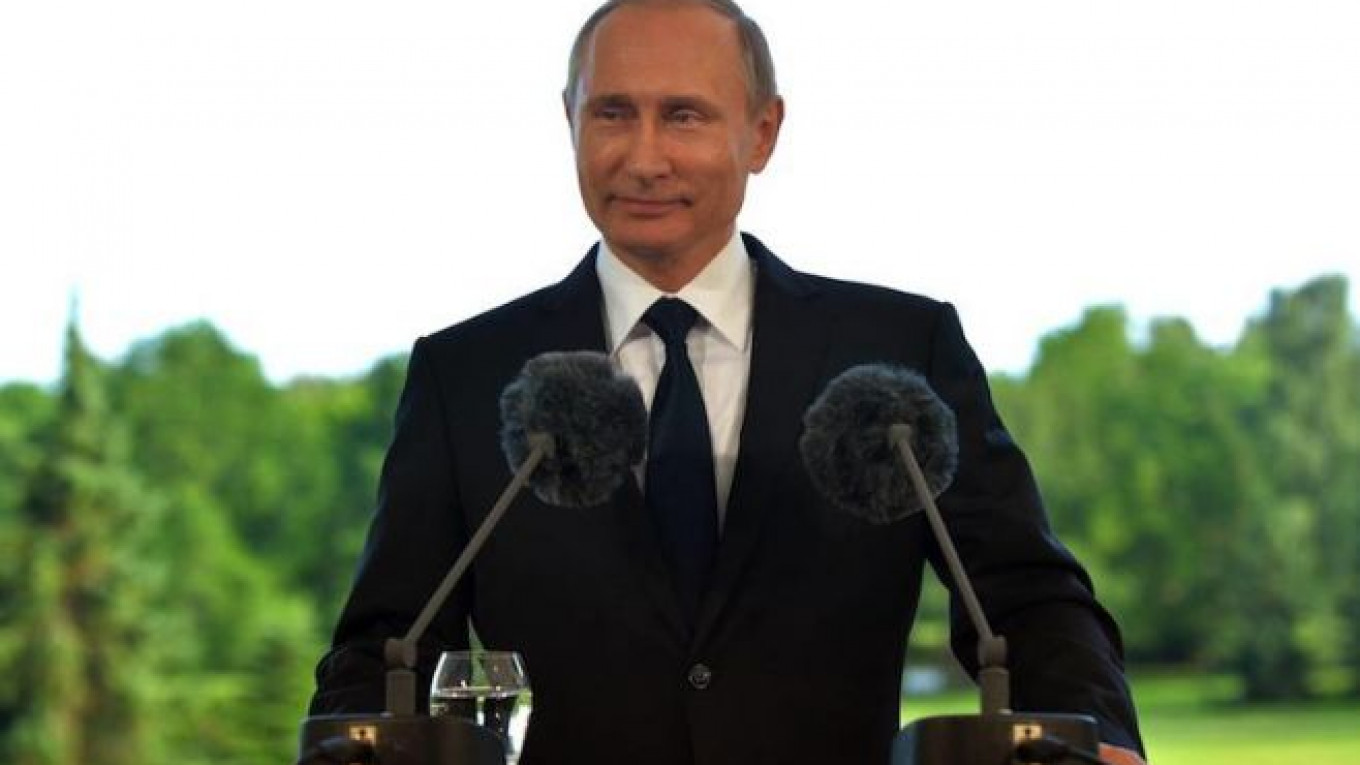 Vladimir Frolov
Vladimir Frolov
Russian President Vladimir Putin is in deconfliction mode with the West after a wild ride of two and a half years of military and diplomatic tensions.
In a wide ranging policy speech at a biannual meeting of Russian ambassadors on July 1, Putin did not just go through the regular litany of complaints over the West ignoring Russia's interests, NATO expansion, U.S. unilateralism, missile defense and overthrowing regimes in "color revolutions." He eschewed saber-rattling over NATO's decisions to deploy additional forces in the Baltics, called Western countries partners in creating a "broad anti-terrorist front," and emphasized Russia's interest in "close cooperation with the United States on international affairs."
Only two weeks before, at the St. Petersburg International Economic Forum, Putin said Russia accepted the United States as the "only superpower" and wanted to work with it, provided the United States kept its democracy lectures to itself. On a visit to Finland a few days ago, Putin agreed to hold a meeting of the Russia-NATO Council after NATO's Warsaw summit this week, accepted NATO's proposal for preventing military air and sea incidents and instructed Russia's defense minister to fly Russian military planes over the Baltic Sea with their transponders on.
Since early 2016, Putin and other senior Russian officials have been signaling Moscow's interest in de-escalating tensions with the West. They want to normalize relations Moscow views as going back to pre-Crimea, bracketing it out as Russia and the West managed to do after Russia's 2008 war with Georgia, without any rollback of Russian policies to exert control over Ukraine.
Moscow has been taking stock of its forceful policies to reassert Russia's status as a global power and to rollback the expansion of Western institutions into the former Soviet space that Russia views as its rightful sphere of influence. These policies of managed confrontation with the West over Ukraine and later Syria have been widely popular with the domestic audience in Russia — over 60 percent think Russia's foreign policy is successful ?€” and boosted Putin's domestic support to stratospheric levels.
Yet, actual policy results have been somewhat underwhelming. Moscow has proven its ability to wreck Ukraine to prevent it from joining Western alliances. But the costs have been enormous both in terms of Western economic sanctions, diplomatic isolation and a ruined relationship with a close neighbor. Yet, the West has refused to recognize Russia's sphere of influence and has ignored calls to flesh out a new Yalta agreement on the post-Cold War settlement. Moscow's military position with regard to the West has actually deteriorated as NATO began applying the worst-case assumptions to Moscow's irresponsible saber-rattling and unpredictable behavior and began planning for additional troop deployments, a race Moscow could not win. The policy of aggressively deterring the United States and NATO was fast approaching a point of diminishing returns.
Russia has weathered the sanctions' impact and its economy did not collapse. But the sanctions have been limited and it became clear that a more forceful Western response, like bans on exports to the EU and the suspension of SWIFT transactions could have resulted in a devastating blow to Russia's economy, while a pivot to Asia proved harder to achieve.
Moscow's daring military intervention in Syria in 2015 succeeded in piercing Russia's isolation over Ukraine and was somewhat breathtakingly hailed as the country's ascension to the elite club on a par with the United States, capable of deploying military force abroad to affect political outcomes. Russia may have rescued Syrian President Bashar Assad's regime from a military defeat, but its investment of blood and treasure has bought it only more Assad and some limited cooperation with the United States. Now, almost a year after its intervention, Moscow is still stuck in Syria and is on the verge of owning its mess of a civil war ?€” Iran is sharing in this investment. It desperately needs a political exit to declare victory and go home, but that could only be engineered through cooperation with the United States, Turkey (hence the latest rapprochement) and Saudi Arabia.
Vladimir Frolov is a political analyst.?
A Message from The Moscow Times:
Dear readers,
We are facing unprecedented challenges. Russia's Prosecutor General's Office has designated The Moscow Times as an "undesirable" organization, criminalizing our work and putting our staff at risk of prosecution. This follows our earlier unjust labeling as a "foreign agent."
These actions are direct attempts to silence independent journalism in Russia. The authorities claim our work "discredits the decisions of the Russian leadership." We see things differently: we strive to provide accurate, unbiased reporting on Russia.
We, the journalists of The Moscow Times, refuse to be silenced. But to continue our work, we need your help.
Your support, no matter how small, makes a world of difference. If you can, please support us monthly starting from just $2. It's quick to set up, and every contribution makes a significant impact.
By supporting The Moscow Times, you're defending open, independent journalism in the face of repression. Thank you for standing with us.
Remind me later.


